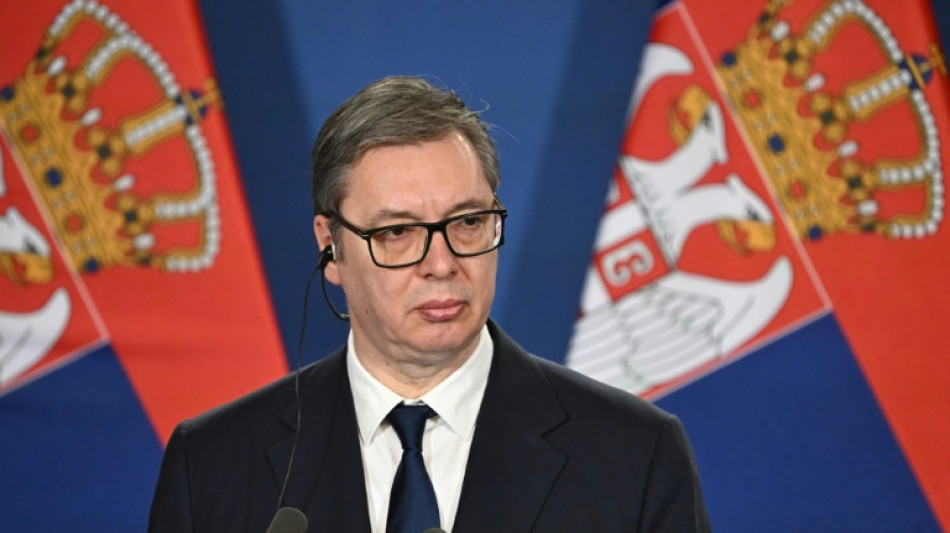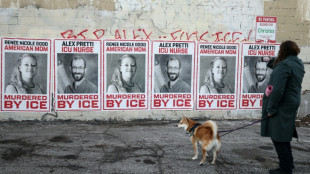

Serbian leader Vucic defies EU with Russia visit
Serbia's President Aleksandar Vucic arrived in Moscow Wednesday for the week's celebrations marking 80 years since the victory over Nazi Germany, risking anger in Brussels as he tries to balance Russian ties and European aspirations.
Russian state TV showed footage of Vucic in the capital, where the Kremlin said he will also have a meeting with President Vladimir Putin after Friday's parade.
"After many years, back in Moscow," Vucic wrote on Instagram, sharing a photo of him at Moscow airport.
The European Union has repeatedly warned it would not look favourably upon such actions by member states or candidate countries, which Serbia has been since 2012.
"Relations with Russia cannot be business as usual," European Commission spokesman Markus Lammert said last week, referring to Moscow's invasion of Ukraine.
But he declined to speculate on any consequences.
That has left room for manoeuvre for Vucic, whom Putin honoured with a top award in 2019 for promoting ties between the countries.
In a sign of the tightrope he is walking, Vucic, who has been in power since 2012, received the Russian ambassador Wednesday before his departure for Moscow, swiftly followed by the British ambassador, just days after a visit to the United States.
The Balkan country has long held close ties with Russia and a shared aversion to NATO since the 1999 Kosovo war bombings.
- Delicate balance -
Since Russian troops invaded Ukraine in February 2022, Belgrade has maintained relations with Moscow and imposed no sanctions, yet supported UN resolutions against it.
Maintaining good relations with Putin without alienating EU favour is "one of the pillars" of Vucic's foreign policy, even if "he has been more careful in recent years", said Florian Bieber, of the University of Graz.
It is also about "calibrating the intensity of Serbia's relationship with Europe", said Eric Gordy, a Balkans specialist at University College London, who compared Vucic's approach to that of former Yugoslav president Josip Broz Tito.
From the Russian side, having "the biggest country and the largest economy in the middle of the Balkans is a very significant lever -- not to directly influence but simply to be present, to provoke... instrumentalise (or even) undermine EU projects," said Nemanja Todorovic Stiplija, from the Belgrade-based Centre for Contemporary Politics think tank.
- Misunderstanding -
Ties include contracts for Russian Mi-17 helicopters and a Pantsir air defence system sold to Serbia.
During the Covid pandemic, Russia provided medical equipment and Sputnik vaccines, while Moscow has supported Serbia at the UN, particularly over Belgrade's claim to its former province of Kosovo, which declared independence in 2008.
The Orthodox Church and the presence in Serbia of Russian media outlets such as Sputnik, TASS and RT Balkan provide useful communication channels for Putin, whose likeness adorns mugs, magnets, t-shirts and socks sold at kiosks in the heart of Belgrade.
Russia also retains a stranglehold through control of gas supplies, with its energy giant Gazprom owning critical energy infrastructure in Serbia.
Vucic faces pressure there too, as Belgrade negotiates a new multi-year gas deal with Russia when the current agreement expires at the end of May.
Russian investment, though, is dwarfed by China, which has pumped billions into Serbia and its Balkan neighbours in recent years, as it tries to expand its economic footprint in central Europe.
Another key player is the EU with whom Serbia conducts most of its trade.
Stiplija said the Kremlin's grip "is not that extensive but the Serbian government is trying to somehow use this misunderstanding... that there is a very big Russian political influence".
For Bieber, there is a "shared influence", pointing out that "most anti-Western media in Serbia are Serbian outlets".
Gordy said that Vucic's Moscow trip is "a populist gesture towards Serbia's right-wing fringe" as he battles widespread protests stemming from a deadly railway station roof collapse in Novi Sad last year that has become a symbol of deep-rooted corruption.
Vucic has accused demonstrators of being backed by foreign powers, in another echo of Putin.
B.Chawla--MT


